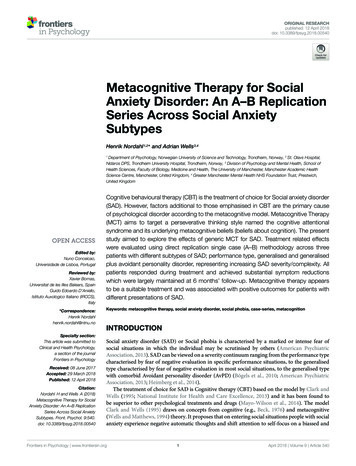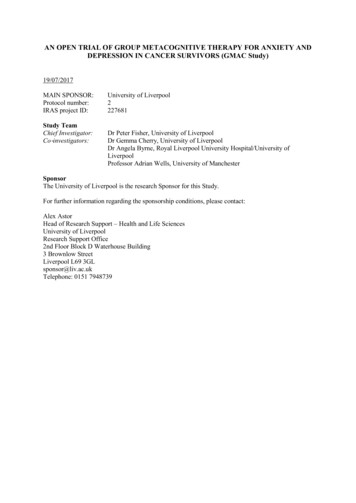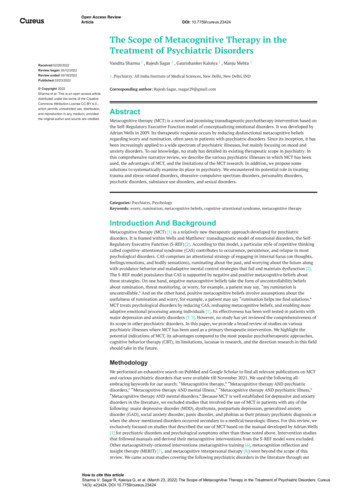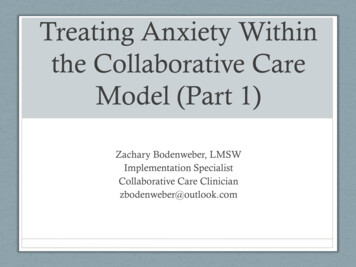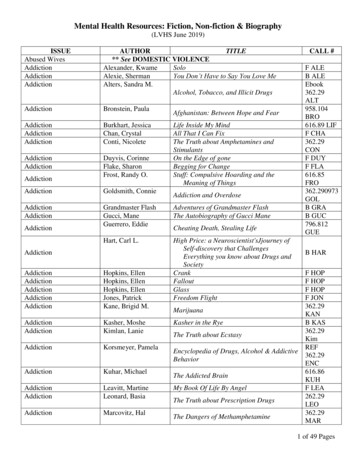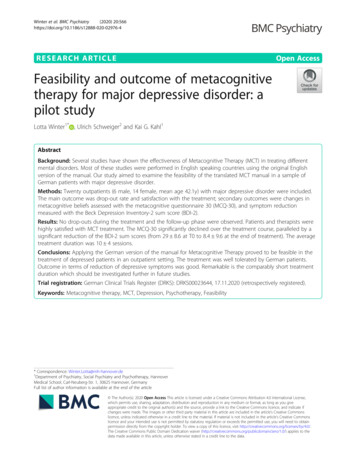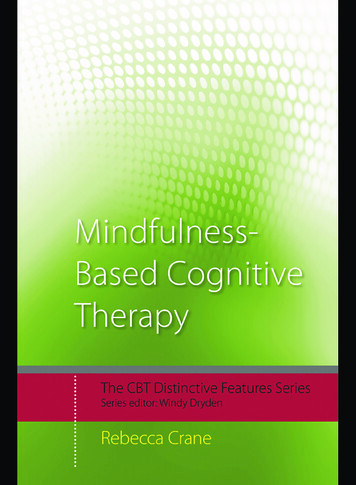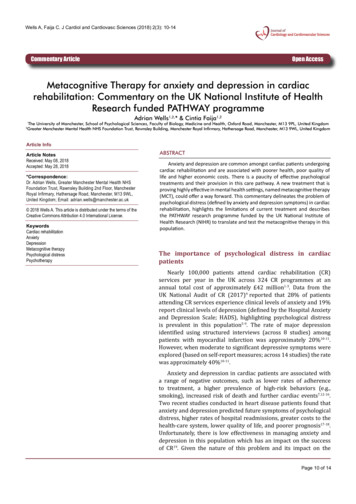
Transcription
Wells A, Faija C. J Cardiol and Cardiovasc Sciences (2018) 2(3): 10-14Commentary ArticleOpen AccessMetacognitive Therapy for anxiety and depression in cardiacrehabilitation: Commentary on the UK National Institute of HealthResearch funded PATHWAY programmeAdrian Wells1,2,* & Cintia Faija1,2The University of Manchester, School of Psychological Sciences, Faculty of Biology, Medicine and Health, Oxford Road, Manchester, M13 9PL, United Kingdom2Greater Manchester Mental Health NHS Foundation Trust, Rawnsley Building, Manchester Royal Infirmary, Hathersage Road, Manchester, M13 9WL, United Kingdom¹Article InfoArticle NotesReceived: May 08, 2018Accepted: May 28, 2018*Correspondence:Dr. Adrian Wells, Greater Manchester Mental Health NHSFoundation Trust, Rawnsley Building 2nd Floor, ManchesterRoyal Infirmary, Hathersage Road, Manchester, M13 9WL,United Kingdom; Email: adrian.wells@manchester.ac.uk 2018 Wells A. This article is distributed under the terms of theCreative Commons Attribution 4.0 International License.KeywordsCardiac rehabilitationAnxietyDepressionMetacognitive therapyPsychological distressPsychotherapy ABSTRACTAnxiety and depression are common amongst cardiac patients undergoingcardiac rehabilitation and are associated with poorer health, poor quality oflife and higher economic costs. There is a paucity of effective psychologicaltreatments and their provision in this care pathway. A new treatment that isproving highly effective in mental health settings, named metacognitive therapy(MCT), could offer a way forward. This commentary delineates the problem ofpsychological distress (defined by anxiety and depression symptoms) in cardiacrehabilitation, highlights the limitations of current treatment and describesthe PATHWAY research programme funded by the UK National Institute ofHealth Research (NIHR) to translate and test the metacognitive therapy in thispopulation.The importance of psychological distress in cardiacpatientsNearly 100,000 patients attend cardiac rehabilitation (CR)services per year in the UK across 324 CR programmes at anannual total cost of approximately 42 million1-3. Data from theUK National Audit of CR (2017)4 reported that 28% of patientsattending CR services experience clinical levels of anxiety and 19%report clinical levels of depression (defined by the Hospital Anxietyand Depression Scale; HADS), highlighting psychological distressis prevalent in this population5-9. The rate of major depressionidentified using structured interviews (across 8 studies) amongpatients with myocardial infarction was approximately 20%10-11.However, when moderate to significant depressive symptoms wereexplored (based on self-report measures; across 14 studies) the ratewas approximately 40%10-11.Anxiety and depression in cardiac patients are associated witha range of negative outcomes, such as lower rates of adherenceto treatment, a higher prevalence of high-risk behaviors (e.g.,smoking), increased risk of death and further cardiac events7,12-16.Two recent studies conducted in heart disease patients found thatanxiety and depression predicted future symptoms of psychologicaldistress, higher rates of hospital readmissions, greater costs to thehealth-care system, lower quality of life, and poorer prognosis17-18.Unfortunately, there is low effectiveness in managing anxiety anddepression in this population which has an impact on the successof CR19. Given the nature of this problem and its impact on thePage 10 of 14
Wells A, Faija C. J Cardiol and Cardiovasc Sciences (2018) 2(3): 10-14individual, on health services and society, it is imperativethat anxiety and depression can be effectively treated in CRservices.CR programmes and psychosocial healthIn 2010, the Department of Health implemented a CRcommissioning pack20. The key aim of the CR programmeis to improve physical health and quality of life, andto support people to develop self-management skills.Core components of the patient care plan include healthbehavior change and education, medical and lifestyle riskfactor management (e.g., physical activity, diet, smokingcessation), and psychosocial health. The psychosocialhealth component is aimed at identifying individuals withclinical levels of anxiety and/or depression, and those withsevere and enduring mental health disorders. The secondedition of the British Association for CardiovascularPrevention and Rehabilitation (BACPR) Standards and Corecomponents (2012)21 suggests referring these patients totrained psychological practitioners. However, the latestedition (2017)22, recommends that when clinical levels ofpsychological distress are related to the cardiac event, anda trained psychologist practitioner exists in the CR team,the patient could be managed within the service. In theabsence of a psychologist in the team, individuals shouldbe referred to trained psychological practitioners andtheir GP should be informed. It is important to highlightthat the majority of CR teams in the UK do not include apsychologist.Although psychological assessment and support areadvocated in the CR commissioning pack20 and in otherkey UK National Health Service policies21-25, only 19%of CR programmes delivered in group format includea psychological component; 2% of patients receiveindividual psychotherapy, and no manualized psychologicalinterventions for depression and/or anxiety are availablefor general use1.Approximately 47% of cardiac patients experienceclinical levels of anxiety or depression at the start ofCR but only 12% move into the normal range aftercompleting the CR programme (6% for anxiety and 6% fordepression)4; thus, most patients continue to experiencepsychological distress. Furthermore, there is evidence thatover time improvements in psychological distress are notmaintained4. Attempts to treat psychological distress incardiac patients include a range of different interventions,i.e., counselling, psycho-education, relaxation, stressmanagement, social support, cognitive behavioural therapy(CBT), and motivational interviewing. Psychologicalinterventions have shown non-significant improvementsin reducing anxiety and depression25-26 or only small effectsizes27-28. In addition, pharmacological and psychologicaltreatments in cardiac patients have shown limited effectsJournal of Cardiology and CardiovascularScienceson health-related quality of life29 and no improvement incardiovascular outcomes30-31. We propose that the reasonfor such approaches having limited effectiveness amongcardiac rehabilitation patients could be due to the factthat they focus on changing behaviours or challenging theevidence of negative thoughts (which may be accurate inpatients with a physical condition) but they do not directlytarget the regulation of worry and rumination which playa key role in the maintenance of psychological distress32.Given the limitations of existing treatments in thiscontext, there is a need to develop new and effectivepsychological treatments that can be implemented in theCR care pathway. The identification of this need has led toa recent research programme, named PATHWAY, fundedby the UK NIHR to examine the effects of a psychologicaltreatment called Metacognitive Therapy (MCT)32.What is MCT and why might it be better?MCT is grounded in a scientifically supported model ofinformation processing in anxiety and depression33-34. It isbased on the principle that anxiety and depression resultfrom the activation of a style of excessive and extendedthinking dominated by worry, rumination and monitoringfor danger. This style increases the sense of current threat.So, in response to a spontaneous negative thought such as“What if I can’t work”, the person who engages in chainsof worrying will prolong and worsen their emotionalstate. This style of thinking has been found to be linkedto underlying metacognitions that are involved in mentalregulation32-34. MCT focuses on increasing the control ofworry and attention in a way that enhances the developmentof more adaptive metacognitions for self-control.MCT has been found to be highly effective in mentalhealth settings in the treatment of anxiety and depressionand more effective than no-treatment control conditionsand CBT35. Unlike treatments such as CBT which challengepatients’ negative thoughts, a major advantage of MCT isthat patients discover they have control of processes suchas worry even when negative thoughts are realistic which islikely to be the case in medical conditions. Furthermore, theset of processes modified in MCT are considered commonto most types of psychological distress including acutestress, anxiety, low mood, and grief, meaning a common setof procedures can be applied in a wide group of patientswithout the need for separate individual formulations.These factors could mean that MCT is more effective thanexisting psychological approaches when introduced inthe CR pathway because it can deal with different types ofpsychological distress experienced within single groups.MCT has been found effective in pilot work across arange of medical conditions including cancer36, Parkinsondisease37-38 and chronic fatigue syndrome39-40. In addition,a recent systematic review demonstrated that unhelpfulPage 11 of 14
Wells A, Faija C. J Cardiol and Cardiovasc Sciences (2018) 2(3): 10-14styles of thinking (worry and/or rumination) predicteddepression, anxiety, and psychological distress in peoplewith a range of long-term health conditions including heartdisease41. Because the control of worry and rumination isspecifically tackled in MCT32 this approach could prove tobe more helpful.A brief overview of PATHWAY Work-StreamsThe PATHWAY programme is a 5-year project fundedunder the UK NIHR Programme Grants for AppliedResearch award (RP-PG-1211-20011). It is comprised ofthree work-streams (WS): WS1 (n 52) is a single-blindrandomized pilot study comparing Group-MCT plus usualCR (intervention arm) versus usual CR alone (control arm),with 4 and 12 months follow up. WS2 extends data fromWS1 with additional recruitment to give an overall sampleof 332 and is a full-scale single-blind randomized controlledtrial (RCT). WS3 is a feasibility trial (n 108) comparingHome-MCT plus usual CR (intervention arm) versus usualCR (control arm), with 4 and 12 months follow up.Seven NHS sites located in the North-West of England areinvolved in the PATHWAY Programme. Sites participatingin WS1 include University Hospital of South ManchesterNHS Foundation Trust; Central Manchester UniversityHospitals NHS Foundation Trust and East Cheshire NHSTrust. Sites added to participate in WS2 include StockportNHS Foundation Trust and Pennine Acute Hospitals NHSTrust. Sites participating in WS3 include Aintree LiverpoolUniversity Hospitals NHS Foundation Trust and BoltonNHS Foundation Trust.Participants for all work-streams are eligible if they arereferred to CR services and they report moderate to highlevels of psychological distress (defined by a score of 8 ormore on the anxiety and/or the depression subscales ofthe HADS42) following a recent cardiac event. The primaryoutcome in WS1 and WS2 is the HADS at post-treatment (4months). Secondary outcomes for these two work-streamsare 12 month HADS score and a range of other symptoms(e.g., post-traumatic stress) and process measures (e.g.,metacognitions). The primary outcome in WS3 is thefeasibility of delivering MCT in a home-based format andsecondary outcomes include the HADS score and othermeasures of psychological processes and quality of life at4 and 12 months follow up. All work-streams incorporatehealth-economics and qualitative components. Serviceuser involvement is a feature of all aspects of the researchprogramme.The main trial (WS2) and the home-based intervention(WS3) are registered in clinicaltrials.gov, the identifier isNCT02420431 and NCT03129282 respectively. The fullprotocol for WS2 has been recently published43. In WS2,CR nurses trained in the delivery of manualized MCT willdeliver the treatment in groups of patients in additionJournal of Cardiology and CardiovascularSciencesto usual CR. The group-MCT intervention consists of sixweekly sessions over 1–1.5 hours. In WS3, participants willundertake a self-help intervention guided by a treatmentmanual which contains 6 modules, and CR nurses willprovide limited telephone support to offer support andguidance on completing the manual.The delivery of MCT in these two formats, i.e. groupand self-help, includes well-specified techniques fordiscovering/developing new strategies to regulate worryand rumination, and modify the metacognitive beliefs thatmaintain unhelpful patterns of thinkingConclusionProvision of effective psychological management ofanxiety and depression in CR lacks on a number of levels.One way forward is to develop effective, evidence-basedand manualized treatments that can be integrated in theCR pathway. With these aims and objectives, the UK NIHRhas funded a programme of research to evaluate theeffects of MCT for anxiety and depression in CR patients.This research programme offers a number of importantpotential impacts. First, we will have valuable data on theeffectiveness of MCT applied in this population; second,we will have two structured and manualized interventions(group and self-help); third, we will have information onthe longer-term health and economic impact of treatment;finally, we hope to gain valuable knowledge on theconditions required for the implementation and furtherdevelopment of interventions for effectively treatingpsychological distress in cardiac patients.It is hoped that the PATHWAY programme will addevidence on MCT among heart disease patients referredto CR services experiencing psychological distress, whichis important to improve clinical outcomes and enhancepatient quality of life and cost-effectiveness.Conflict of interest statementProfessor Adrian Wells is the developer of MCT and aco-director of the MCT Institute. He is chief investigatorand grant holder on the PATHWAY programme. He hasauthored books on cognitive therapy and metacognitivetherapy and receives royalties from these. The authorsdeclare no other conflicts of interest.Funding informationThe PATHWAY Programme is funded by the UK NationalInstitute for Health Research (NIHR) under its ProgrammeGrants for Applied Research scheme (RP-PG-121120011).References1.National Audit of Cardiac Rehabilitation. Annual Report. York, UK:British Heart Foundation, University of York; 2012. Available 2012.pdf [Accessed24 May 2018]Page 12 of 14
Wells A, Faija C. J Cardiol and Cardiovasc Sciences (2018) 2(3): 10-142.3.4.5.6.7.8.9.NHS Scotland. Cardiac Rehabilitation in Scotland; 2013. pics/Heart-Disease/Publications/ [Accessed 24 May 2018]NHS England. Increase Uptake of Cardiac Rehabilitation for Peoplewith Coronary Artery Disease and Following Acute Heart Failure;2014. Available from: /02/pm-fs-3-10.pdf [Accessed 24 May 2018].Pogosova N, Saner H, Pedersen SS, et al. Cardiac RehabilitationSection of the European Association of Cardiovascular Preventionand Rehabilitation of the European Society of Cardiology. EuropeanJournal of Preventive Cardiology. 2015; 22(10): 1290-306.Gandjour A, Lauterbach KM. Review of quality-of-life evaluations inpatients with angina pectoris. Pharmacoeconomics. 1999; 16(2):141-52.Lewin RJP. Improving quality of life in patients with angina. Heart.1999; 82: 654-655.Naylor C, Parsonage M, McDaid D, et al. Report. Long-term conditionsand mental health - The cost of co- morbidities. The King’s Fund andCentre for Mental Health. 2012; 1: 32. Available from: m-conditions-and-mentalhealth [Accessed 24 May 2018].Thombs BD, Bass EB, Ford DE, et al. Prevalence of depression insurvivors of acute myocardial infarction – Review of the Evidence.Journal of General Internal Medicine. 2006; 21(1): 30-38.Tully PJ, Cosh SM, Baumeister H. The anxious heart in whose mind?A systematic review and meta-regression of factors associated withanxiety disorder diagnosis, treatment and morbidity risk in coronaryheart disease. Journal of Psychosomatic Research. 2014; 77(6): 43948.10. Thombs BD, Bass EB, Ford DE, et al. Prevalence of depression insurvivors of acute myocardial infarction. Journal of General InternalMedicine. 2006; 21(1): 30-38.11. Carney RM, Freedland KE. Depression, mortality, and medicalmorbidity in patients with coronary heart disease. BiologicalPsychiatry. 2003; 54(3): 241-247.12. Bush DE, Ziegelstein RC, Tayback M, et al. Even minimal symptoms ofdepression increase mortality risk after acute myocardial infarction.American Journal of Cardiology. 2001; 88(4): 337-41.13. Hare DL, Toukhsati SR, Johansson P, et al. Depression andcardiovascular disease: A clinical review. European Heart Journal.2014; 35(21): 1365-72.14. Rutledge T, Linke SE, Krantz DS, et al. Psychosomatic Medicine. 2009;71(9): 958-64.15. Batelaan NM, Seldenrijk A, Bot M, et al. Anxiety and new onset ofcardiovascular disease: Critical review and meta-analysis. BritishJournal of Psychiatry. 2016; 208(3): 223-31.16. Frasure-Smith N, Lespérance F, Talajic M. Depression and 18-monthprognosis after myocardial infarction. Circulation. 1993; 91(4): 9991005.17. Palacios J, Khondoker M, Mann A, et al. Depression and anxietysymptom trajectories in coronary heart disease: Associations withmeasures of disability and impact on 3-year health care costs. Journalof Psychosomatic Research. 2018; 104: 1-8.18. Baumeister H, Haschke A, Munzinger M, et al. Inpatient and outpatientcosts in patients with coronary artery disease and mental disorders:A systematic review. BioPsychoSocial Medicine. 2015; 17: 9-11.19. National Audit of Cardiac Rehabilitation (NACR) - Annual StatisticalReport 2017. Available from sticalreport-2017. [Accessed 24 May 2018]Journal of Cardiology and CardiovascularSciences20. Department of Health. Commissioning Pack for CardiacRehabilitation. London, UK: Department of Health; ves.gov.uk/ ations/PublicationsPolicyAndGuidance/Browsable/DH 117504 [Accessed24 May 2018]21. British Association for Cardiovascular Prevention and Rehabilitation.The BACPR Standards and Core Components for CardiovascularDisease Prevention and Rehabilitation (2nd Edition). UK: BACPR; 2012.Available from: http://www.bacpr.com/resources/46C BACPRStandards and Core Components 2012.pdf [Accessed 24 May 2018]22. British Association for Cardiovascular Prevention and Rehabilitation.The BACPR Standards and Core Components for CardiovascularDisease Prevention and Rehabilitation (3rd Edition). UK: BACPR;2017. Available from: http://www.bacpr.com/resources/BACPRStandards and Core Components 2017.pdf [Accessed 24 May 2018]23. HM Government. No Health without Mental Health: A CrossGovernment Mental Health Outcomes Strategy for People of All Ages.London, UK: Department of Health; 2011. Available from: ds/attachmentdata/file/213761/dh 124058.pdf [Accessed 24 May 2018]24. National Institute for Health and Clinical Excellence. Depressionin Adults with a Chronic Physical Health Problem: Recognition andManagement. London: National Institute for Health and ClinicalExcellence; 2009. Available from: https://www.nice.org.uk/Guidance/CG91 [Accessed 6 24 May 2018]25. Reid J, Ski CF, Thompson DR. Psychological interventions for patientswith coronary heart disease and their partners: A systematic review.PloS ONE. 2013; 8(9): e73459.26. Jiang Y, Shorey S, Seah B, et al. The effectiveness of psychologicalinterventions on self-care, psychological and health outcomes inpatients with chronic heart failure - A systematic review and metaanalysis.International Journal of Nursing Studies. 2018; 78: 16-25.27. Whalley B, Rees K, Davies P, et al. Psychological interventions forcoronary disease (Review). Cochrane Database Systematic Reviews.2011; (8): CD002902.28. Dickens C, Cherrington A, Adeyemi I, et al. Characteristics ofpsychological interventions that improve depression in people withcoronary heart disease: A systematic review and meta-regression.Psychosomatic Medicine. 2013; 75(2): 211-221.29. O’Neil A, Sanderson K, Oldenburg B, et al. Impact of depressiontreatment on mental and physical health-related quality of lifeof cardiac patients: A meta-analysis. Journal of CardiopulmonaryRehabilitation and Prevention. 2011; 31(3): 146-56.30. Baumeister H, Hutter N, Bengel J. Psychological and pharmacologicalinterventions for depression in patients with coronary artery disease.Cochrane Database Systematic Reviews. 2011; (9): CD008012.31. Rutledge T, Redwine L, Linke SE, et al. A meta-analysis of mentalhealth treatments and cardiac rehabilitation for improving clinicaloutcomes and depression among patients with coronary heartdisease. Psychosomatic Medicine. 2013; 75(4): 335-349.32. Wells A. Metacognitive Therapy for Anxiety and Depression. London,UK; Guilford Press; 2009.33. Wells A, Matthews G. Attention and emotion: A clinical perspective.Hove:Erlbaum; 1994.34. Wells A, Matthews G. Modelling Cognition in Emotional Disorder: TheS-REF MODEL. Behaviour Research Therapy. 1996; 34(11): 881–888.35. Normann N, van Emmerik AAP, Morina N. The efficacy ofmetacognitive therapy for anxiety and depression: A meta-analyticreview. Depression and Anxiety. 2014; 31(5): 402-411.36. Cook SA, Salmon P, Dunn G, et al. A prospective study of the associationPage 13 of 14
Wells A, Faija C. J Cardiol and Cardiovasc Sciences (2018) 2(3): 10-14Journal of Cardiology and CardiovascularSciencesof metacognitive beliefs and processes with persistent emotionaldistress after diagnosis of cancer. Cognitive Therapy and Research.2015; 39(1): 51-60.40. Maher-Edwards L, Fernie, BA, Murphy G, et al. Metacognitive factorsin chronic fatigue syndrome. Clinical Psychology and Psychotherapy.2012; 19(6): 552-7.38. Fernie BA, Spada MM, Ray Chaudhuri K, et al. Thinking about motorfluctuations: An examination of metacognitions in Parkinson’sdisease. Journal of Psychosomatic Research. 2015; 79(6): 669-73.42. Zigmond AS, Snaith RP. The hospital anxiety and depression scale.Acta Psychiatrica Scandinavica. 1983; 67(6): 361-370.37. Allott R, Wells A, Morrison AP, et al. Distress in Parkinson’s disease:Contributions of disease factors and metacognitive style. BritishJournal of Psychiatry. 2005; 187(2): 182-183.39. Maher-Edwards L, Fernie BA, Murphy G, et al. Metacognitions andnegative emotions as predictors of symptom severity in chronicfatigue syndrome. Journal of Psychosomatic Research. 2011; 70(4):311-7.41. Trick L, Watkins E, Windeatt S, et al. The association of perseverativenegative thinking with depression, anxiety and emotional distressin people with long term conditions: A systematic review. Journal ofPsychosomatic Research. 2016; 91: 89-101.43. Wells A, McNicol K, Reeves D, et al. Improving the effectiveness ofpsychological interventions for depression and anxiety in the cardiacrehabilitation pathway using group-based metacognitive therapy(PATHWAY Group MCT): Study protocol for a randomised controlledtrial. Trials. 2018; 19: 215.Page 14 of 14
Anxiety Depression Metacognitive therapy Psychological distress Psychotherapy ABSTRACT Anxiety and depression are common amongst cardiac patients undergoing cardiac rehabilitation and are associated with poorer health, poor quality of treatments and their provision in this care pathway. A new treatment that is

